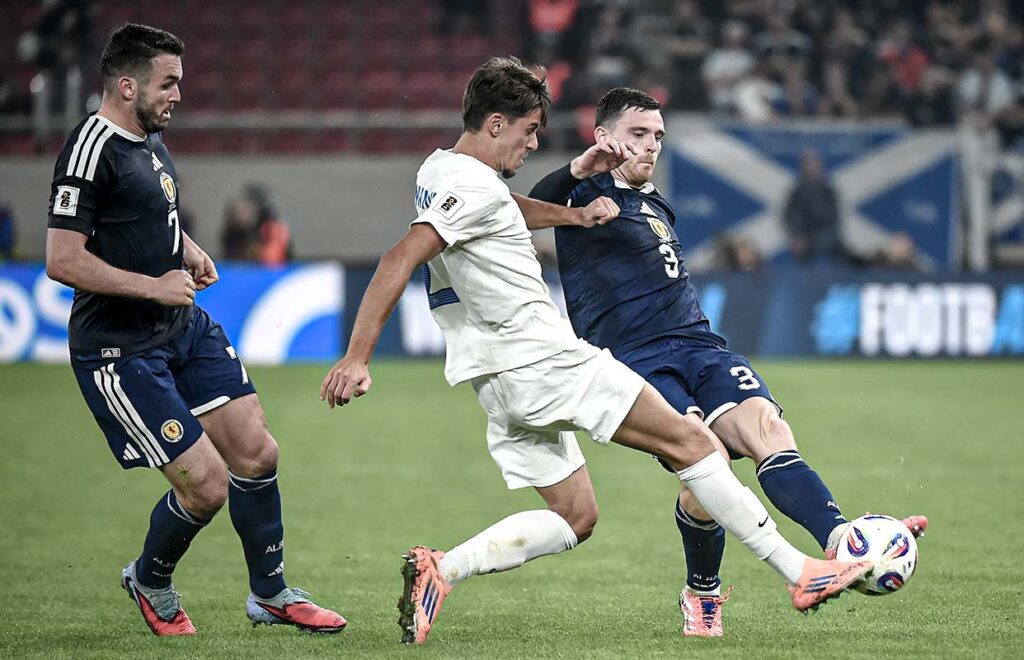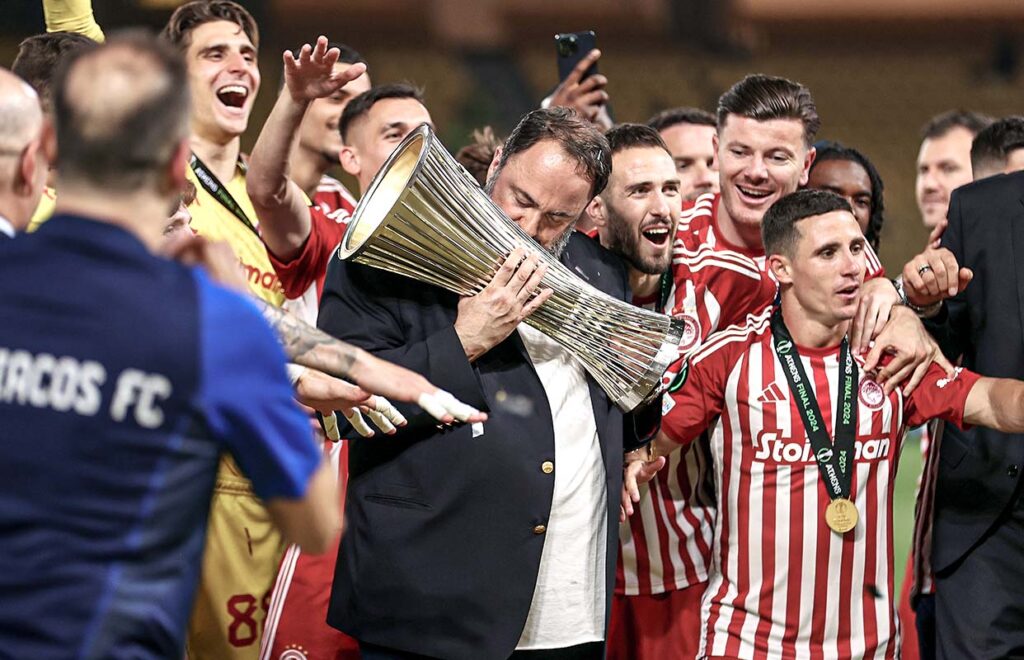Sotiris Silaidopoulos
Rio Ave FC, 2025-
When Greece won Euro 2004 on Portuguese soil, I was on Kos Island, where I grew up.
I couldn’t have imagined that, 21 years later, I would be in Portugal coaching Rio Ave FC in the Primeira Liga – and coming up against football icons like José Mourinho.
It seems appropriate that Rio Ave is where the Greek national team trained in that never-to-be-forgotten summer of 2004. For me, that felt like a sign. Rio Ave FC is my first coaching experience outside Greece, after spending my entire playing career at home and beginning my managerial path in Greek football. My years as a player were unfortunately marked by several injuries. One of them, however, ended up saving my life.

At 28, I needed shoulder surgery, but the pre-operative tests revealed much more than a fracture. Doctors discovered a rare malignant tumour in my thoracic area – a growth in my chest that none of us were expecting. Within days, football was replaced by six months of chemotherapy sessions. It was a huge shock, but I would go through it all again for what came afterwards. The tumour was removed, and thankfully I am healthy today, carrying the perspective that experience gave me.
I began to see life with more clarity and let go of the things that didn’t matter. That period shaped my personality, and taught me to put everything into perspective during difficult times.
Another lesson from that chapter of my life is that anything is possible if you truly believe and keep fighting. Football and life have many similarities – they share the same values in both success and failure.
“For any manager, the first major professional opportunity is decisive”
I continued playing until I was 30, when I finally lost the battle with my knees. Becoming a coach wasn’t even on my mind then, until a former teammate convinced me to join him on the UEFA courses. So at 32 I took charge of Antagoras Kos, my hometown club. We won two consecutive regional championships while I continued my coaching education.
During my UEFA A Licence, the bigger clubs began to notice me. Panathinaikos – through Ioannis Samaras and Nikos Dabizas, then the academy and first-team directors – invited me to take charge of their Under-16 team.
For any manager, the first major professional opportunity is decisive. I was lucky that mine came under Samaras. There I found an inspiring environment and, in him, a mentor. I also worked with a special generation of players, including Georgios Vagiannidis, Vasilios Zagaritis, Sotiris Alexandropoulos and many others who remain top-flight players in Greece.

The five years I spent at Panathinaikos were essential for my development. That group of players and I progressed together from the Under-16s to the first team, where I became assistant manager and interim manager.
But reaching the professional level is never the end – it is the beginning of a new journey. Talent gets you there; personality keeps you there. That is why building the person is just as important as building the player.
In 2021, the club offered me the chance to manage the newly created B team. I turned down first-division offers to accept it. But on the eve of the season, the board changed its mind and appointed a former player instead. It was frustrating, but it marked the beginning of something bigger.
“To understand the success that followed, you have to go back to my early days at the club”
Shortly afterwards, Olympiacos approached me. The offer was to coach their Under-17s. From the outside it might not have looked like the obvious next step, but for me it was a chance to join a giant – the most successful club in Greece.
Under Evangelos Marinakis, the club’s president, Olympiacos had become a highly structured European organisation. He restored a winning mentality that is part of the club’s DNA, backed by state-of-the-art facilities and world-class personalities such as Christian Karembeu and Darko Kovacevic.
Everything started from the vision of the owner. It was no coincidence that Olympiacos became the first club in history to win two UEFA trophies in the same season [excluding one-off Super Cups]: the UEFA Youth League and the Conference League in 2023/24. I was fortunate and proud to be directly involved in both achievements.

But to understand the success that followed, you have to go back to my early days at the club. I coached only five matches for the Under-17s before taking charge of the Under-19s. The plan was to develop a golden generation.
Together with the club and the academy’s technical director at the time, José Anigo, we adopted a bold strategy. We promoted exceptional talents who were younger than the category – some as young as 14 or 15 – into the Under-19s. Among them were players like Charalampos Kostoulas, Christos Mouzakitis, Antonis Papakanellos, Theofanis Bakoulas and Stavros Pnevmonidis.
After developing a remarkable generation at Panathinaikos, I was fortunate again to work with one of the most promising groups in Olympiacos’ history. It is no coincidence that the two biggest academy transfers from both clubs – Vagiannidis to Sporting Lisbon and Charalampos Kostoulas to Brighton & Hove Albion – were players I had the privilege to work with closely. Many others from this group have since become full Greek internationals.
“It wasn’t simply about a new system. It was about taking players out of their comfort zone”
Taking risks requires conviction and patience. In our first year with the Olympiacos Under-19s, we finished eighth – the worst in the club’s history. But then we won two Greek Under-19 championships in a row. In a season of domestic dominance in 2023/24, we also won the UEFA Youth League – the academy equivalent of the Champions League. It was an unprecedented achievement for Greek football.
During that campaign, we made another important decision. Olympiacos used a 1-4-2-3-1 system throughout their youth structure and first team. After meeting with the technical director and staff, we agreed to change to a 1-3-4-2-1.
It wasn’t simply about a new system. It was about taking players out of their comfort zone. After years in the same structure, automatic reactions develop. I wanted them to experience new scenarios shaped by evolving timings, spaces and dynamic demands. As players progress, they must develop adaptability, and that was our aim. Today, I am proud to see those game-model principles and formations still used within the Olympiacos academy.

The management embraced the idea, and my own staff played such an important role in the success that followed. The results were spectacular. I am proud to be the first Greek coach to win Europe’s top youth competition, but even prouder of how we did it.
The squad was 100 per cent Greek, entirely homegrown, and played proactive, courageous football – far from the defensive stereotype often associated with Greek teams. We went to the final unbeaten, defeating the top French academies FC Nantes and RC Lens, as well as Inter and Bayern Munich, then AC Milan 3-0.
During that period, my connection with the first team grew. In February 2024, after Carlos Carvalhal left, I became interim manager, making me one of the few to coach both Olympiacos and Panathinaikos at first-team level, even in an interim capacity. José Luis Mendilibar soon arrived, and I became his assistant while continuing with the Under-19s.
“The atmosphere was electric – so intense you could almost feel it physically”
There were weeks when I coached the Under-19s in one country and the first team in another. For example, I managed the Youth League match against Bayern Munich in Germany, and the next day was in Serbia with the first team for a match against Maccabi Tel Aviv. Winning that game 6-1 was the turning point en route to winning the Conference League.
And working with Mr Mendilibar was transformative. Beyond being a brilliant coach, he is an honest and inspiring human being for everyone around him.
About a month after the Youth League final, Olympiacos faced Fiorentina in the Conference League final. By fate, it was played in Athens. The atmosphere was electric – so intense you could almost feel it physically. Everyone who was in the stadium will tell you the energy after the final whistle was unforgettable.
A late extra-time goal gave us a 1-0 win. The celebrations in the stadium and across the city were indescribable. In less than 40 days, I experienced two historic European trophies – something unprecedented in Greek football.

In 2025, I received an offer to coach Rio Ave FC. It was a difficult decision. The choice was between continuing at Olympiacos as assistant coach, after a double-winning season and with the opportunity to experience the Champions League – or taking a path that would help me grow further. I chose Rio Ave.
Shortly after José Mourinho became Benfica head coach, we travelled to play his new team. When we arrived at the Estádio da Luz, my assistant coach said Mourinho wanted to speak with me. I thought my assistant was joking, but he insisted. So I went out and Mourinho was in the corridor waiting to welcome me and have a small discussion. That shows his class and what a person he is. His father had been the coach of Rio Ave FC in the 1980s, during which time they reached the cup final.
Now it is my responsibility to do my best for the club. As the first Greek manager in Portugal, I also have the responsibility to represent Greek coaches at a high level – something I accepted with pride and conviction. I always embrace challenges, and this is an ambitious project at a club with tradition, identity and enormous potential in a demanding league. It is a step that will develop me professionally and personally, and shape the next stage of my journey.
From the Aegean to Piraeus and now the Atlantic, the sea has always guided my path. This next chapter feels like the natural continuation of that journey. Because for me, if you want to be known as a good developer, the first person you must develop is yourself.

Sotiris Silaidopoulos


